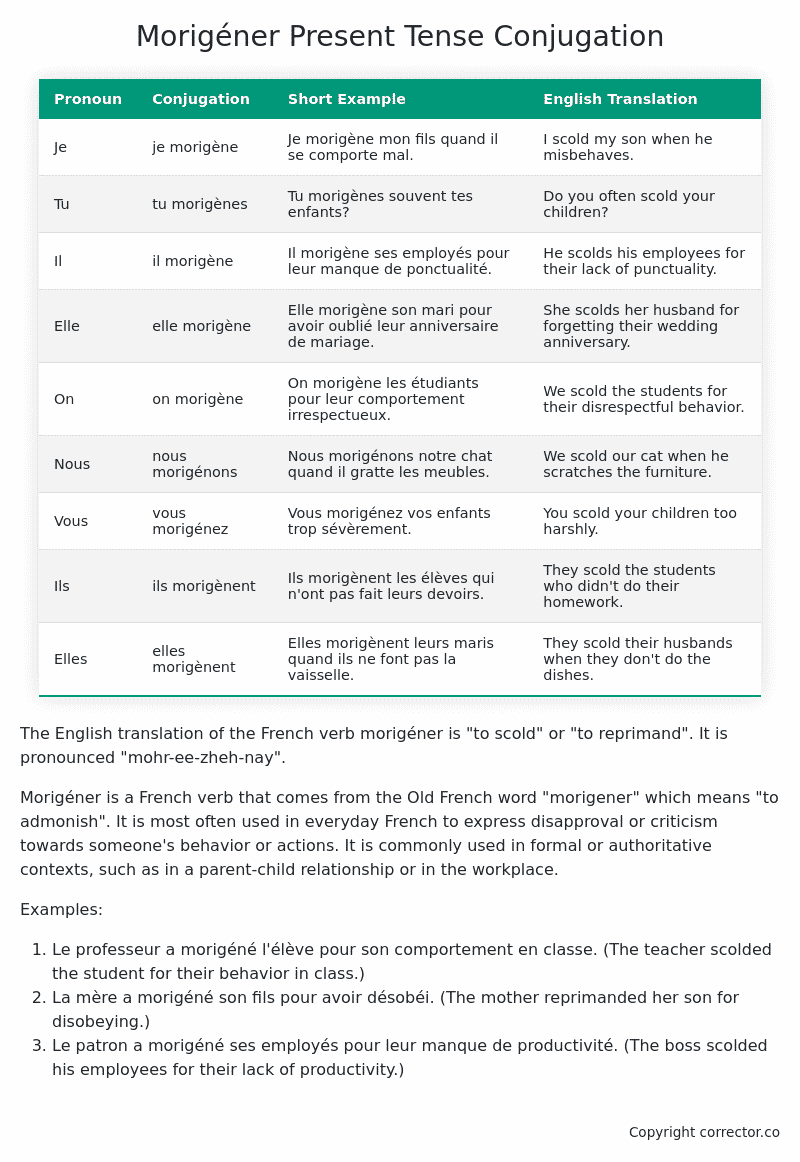Le Present (Present Tense) Conjugation of the French Verb morigéner
Introduction to the verb morigéner
The English translation of the French verb morigéner is “to scold” or “to reprimand”. It is pronounced “mohr-ee-zheh-nay”.
Morigéner is a French verb that comes from the Old French word “morigener” which means “to admonish”. It is most often used in everyday French to express disapproval or criticism towards someone’s behavior or actions. It is commonly used in formal or authoritative contexts, such as in a parent-child relationship or in the workplace.
Examples:
- Le professeur a morigéné l’élève pour son comportement en classe. (The teacher scolded the student for their behavior in class.)
- La mère a morigéné son fils pour avoir désobéi. (The mother reprimanded her son for disobeying.)
- Le patron a morigéné ses employés pour leur manque de productivité. (The boss scolded his employees for their lack of productivity.)
Morigéner – About the French Present Tense
To take a deep dive into all the French tenses then see our article on Mastering French Tense Conjugation.
Common Everyday Usage Patterns For Le Present
Interactions with Other Tenses
Table of the Present Tense Conjugation of morigéner
| Pronoun | Conjugation | Short Example | English Translation |
|---|---|---|---|
| Je | je morigène | Je morigène mon fils quand il se comporte mal. | I scold my son when he misbehaves. |
| Tu | tu morigènes | Tu morigènes souvent tes enfants? | Do you often scold your children? |
| Il | il morigène | Il morigène ses employés pour leur manque de ponctualité. | He scolds his employees for their lack of punctuality. |
| Elle | elle morigène | Elle morigène son mari pour avoir oublié leur anniversaire de mariage. | She scolds her husband for forgetting their wedding anniversary. |
| On | on morigène | On morigène les étudiants pour leur comportement irrespectueux. | We scold the students for their disrespectful behavior. |
| Nous | nous morigénons | Nous morigénons notre chat quand il gratte les meubles. | We scold our cat when he scratches the furniture. |
| Vous | vous morigénez | Vous morigénez vos enfants trop sévèrement. | You scold your children too harshly. |
| Ils | ils morigènent | Ils morigènent les élèves qui n’ont pas fait leurs devoirs. | They scold the students who didn’t do their homework. |
| Elles | elles morigènent | Elles morigènent leurs maris quand ils ne font pas la vaisselle. | They scold their husbands when they don’t do the dishes. |
Other Conjugations for Morigéner.
Le Present (Present Tense) Conjugation of the French Verb morigéner (this article)
Imparfait (Imperfect) Tense Conjugation of the French Verb morigéner
Passé Simple (Simple Past) Tense Conjugation of the French Verb morigéner
Passé Composé (Present Perfect) Tense Conjugation of the French Verb morigéner
Futur Simple (Simple Future) Tense Conjugation of the French Verb morigéner
Futur Proche (Near Future) Tense Conjugation of the French Verb morigéner
Plus-que-parfait (Pluperfect) Tense Conjugation of the French Verb morigéner
Passé Antérieur (Past Anterior) Tense Conjugation of the French Verb morigéner
Futur Antérieur (Future Anterior) Tense Conjugation of the French Verb morigéner
Subjonctif Présent (Subjunctive Present) Tense Conjugation of the French Verb morigéner
Subjonctif Passé (Subjunctive Past) Tense Conjugation of the French Verb morigéner
Subjonctif Imparfait (Subjunctive Imperfect) Tense Conjugation of the French Verb morigéner
Subjonctif Plus-que-parfait (Subjunctive Pluperfect) Tense Conjugation of the French Verb morigéner
Conditionnel Présent (Conditional Present) Tense Conjugation of the French Verb morigéner
Conditionnel Passé (Conditional Past) Tense Conjugation of the French Verb morigéner
L’impératif Présent (Imperative Present) Tense Conjugation of the French Verb morigéner
L’infinitif Présent (Infinitive Present) Tense Conjugation of the French Verb morigéner
Struggling with French verbs or the language in general? Why not use our free French Grammar Checker – no registration required!
Get a FREE Download Study Sheet of this Conjugation 🔥
Simply right click the image below, click “save image” and get your free reference for the morigéner Present Tense tense conjugation!

I hope you enjoyed this article on the verb morigéner. Still in a learning mood? Check out another TOTALLY random French verb present conjugation!


